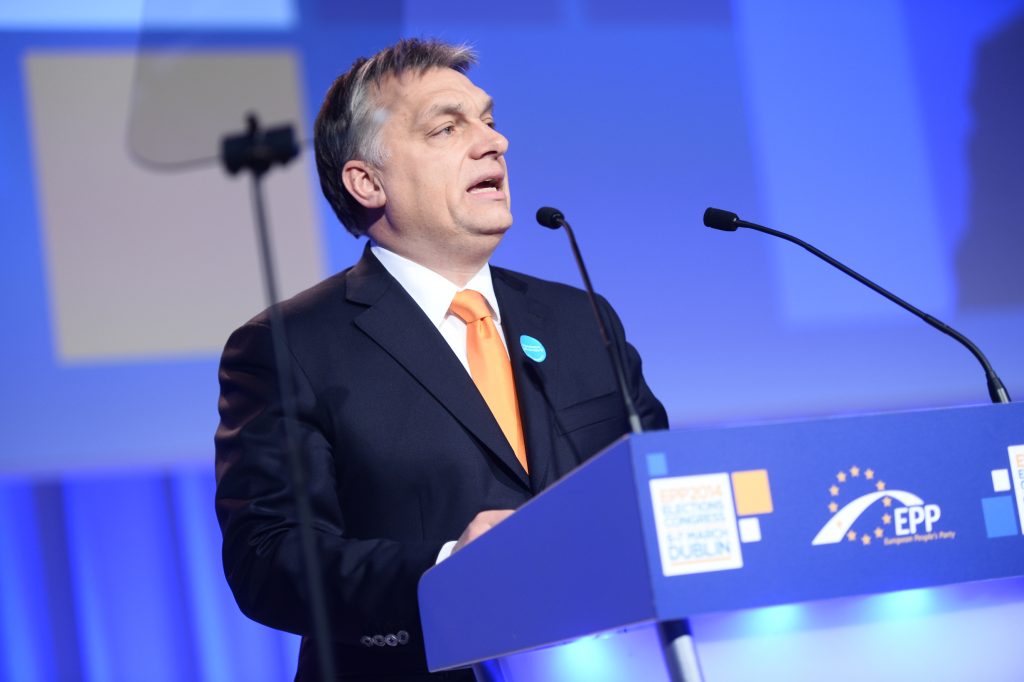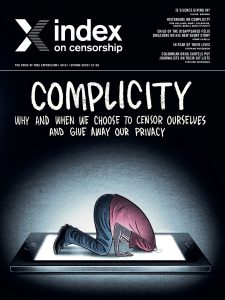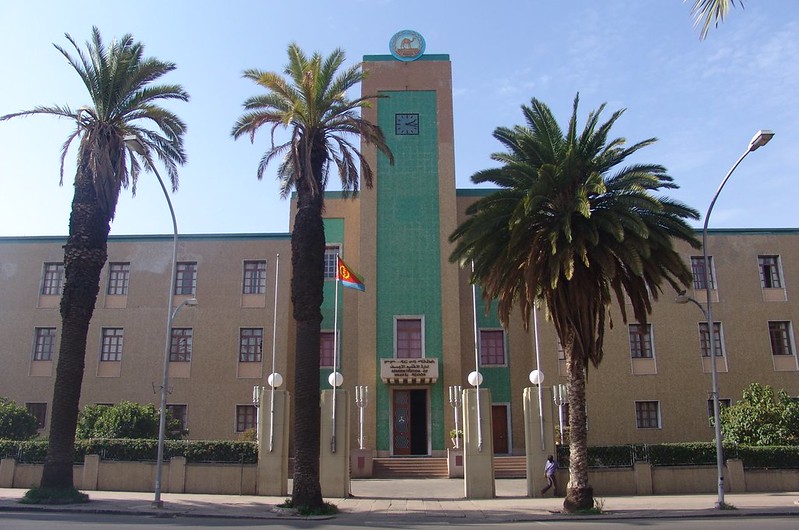24 Apr 2020 | Index in the Press
[vc_row][vc_column][vc_column_text]Editor-in-chief of Index on Censorship magazine, Rachael Jolley, writes in the New Statesman on how the rights to press freedom are being violated around the world in the wake of the coronavirus crisis. Index is running a project to map these incidents.
“Challenges are coming at us from all directions. But the public’s right to know should not be erased during this time,” she wrote.
Read the full article here. [/vc_column_text][/vc_column][/vc_row]
8 Apr 2020 | Hungary, News
[vc_row][vc_column][vc_column_text]

Viktor Orbán Credit: European People’s Party/Flickr
[/vc_column_text][vc_column_text]Hungary’s prime minister Viktor Orbán, leader of right-wing nationalist party Fidesz, has responded to the coronavirus crisis by pushing through sweeping emergency laws that have no time limit and have enormous potential to limit media freedom.
These laws essentially allow Orbán to rule by decree, which presents a huge threat to democracy and freedom of expression. While Index acknowledges that extraordinary measures need to be taken to protect lives, the passing of emergency laws of this nature for an indefinite time period was described in an Index statement as “an abuse of power”.
Under the emergency laws, journalists can be imprisoned for up to five years for publishing what the authorities consider to be falsehoods about the outbreak or measures taken to control it. But what exactly constitutes falsehoods is open to interpretation.
As Index notes, Hungary already has “one of the worst free speech records in Europe”. This further blow to journalists’ ability to report freely and objectively on the actions taken by the government is crippling for press freedom. It follows a pattern of state authorities infringing on press freedom under the guise of quashing “fake news” that Index has recorded happening globally in the wake of the crisis.
Transparency about the official numbers of those infected and those who have died from Covid-19 is critical for public safety. The scale of the outbreak will inform public behaviour and support for health services. Authoritarian regimes around the world such as North Korea and Turkmenistan have reported zero cases, the implausibility of which suggests censorship of the real figures by these countries’ despotic leaders.
Orbán is on the road to joining these leaders as, under the emergency laws, journalists are unable to hold the government to account over the accuracy of the data. Orbán has singular control of the public knowledge of the number of confirmed coronavirus cases, which, according to a government website, is 817 to date. See more here about this on the Index map tracking attacks on media freedom in Hungary.
Hungary’s neighbour Austria, which has a smaller population and recorded its first cases just 8 days before Hungary, has to date recorded 12,206 cases.[/vc_column_text][/vc_column][/vc_row][vc_row][vc_column][vc_basic_grid post_type=”post” max_items=”3″ grid_id=”vc_gid:1586344862424-03642fb1-d46b-2″ taxonomies=”4157″][/vc_column][/vc_row]
30 Mar 2020 | Magazine, Magazine Contents, Volume 49.01 Spring 2020
[vc_row][vc_column][vc_custom_heading text=”With contributions from Ak Welsapar, Julian Baggini, Alison Flood, Jean-Paul Marthoz and Victoria Pavlova”][/vc_column][/vc_row][vc_row][vc_column][vc_column_text]
 The Spring 2020 issue of Index on Censorship magazine looks at our own role in free speech violations. In this issue we talk to Swedish people who are willingly having microchips inserted under their skin. Noelle Mateer writes about living in China as her neighbours, and her landlord, embraced video surveillance cameras. The historian Tom Holland highlights the best examples from the past of people willing to self-censor. Jemimah Steinfeld discusses holding back from difficult conversations at the dinner table, alongside interviewing Helen Lewis on one of the most heated conversations of today. And Steven Borowiec asks why a North Korean is protesting against the current South Korean government. Plus Mark Frary tests the popular apps to see how much data you are knowingly – or unknowingly – giving away.
The Spring 2020 issue of Index on Censorship magazine looks at our own role in free speech violations. In this issue we talk to Swedish people who are willingly having microchips inserted under their skin. Noelle Mateer writes about living in China as her neighbours, and her landlord, embraced video surveillance cameras. The historian Tom Holland highlights the best examples from the past of people willing to self-censor. Jemimah Steinfeld discusses holding back from difficult conversations at the dinner table, alongside interviewing Helen Lewis on one of the most heated conversations of today. And Steven Borowiec asks why a North Korean is protesting against the current South Korean government. Plus Mark Frary tests the popular apps to see how much data you are knowingly – or unknowingly – giving away.
In our In Focus section, we sit down with different generations of people from Turkey and China and discuss with them what they can and cannot talk about today compared to the past. We also look at how as world demand for cocaine grows, journalists in Colombia are increasingly under threat. Finally, is internet browsing biased against LBGTQ stories? A special Index investigation.
Our culture section contains an exclusive short story from Libyan writer Najwa Bin Shatwan about an author changing her story to people please, as well as stories from Argentina and Bangladesh.
[/vc_column_text][/vc_column][/vc_row][vc_row][vc_column][vc_custom_heading text=”Special Report”][/vc_column][/vc_row][vc_row][vc_column][vc_column_text]Willingly watched by Noelle Mateer: Chinese people are installing their own video cameras as they believe losing privacy is a price they are willing to pay for enhanced safety
The big deal by Jean-Paul Marthoz: French journalists past and present have felt pressure to conform to the view of the tribe in their reporting
Don’t let them call the tune by Jeffrey Wasserstrom: A professor debates the moral questions about speaking at events sponsored by an organisation with links to the Chinese government
Chipping away at our privacy by Nathalie Rothschild: Swedes are having microchips inserted under their skin. What does that mean for their privacy?
There’s nothing wrong with being scared by Kirsten Han: As a journalist from Singapore grows up, her views on those who have self-censored change
How to ruin a good dinner party by Jemimah Steinfeld: We’re told not to discuss sex, politics and religion at the dinner table, but what happens to our free speech when we give in to that rule?
Sshh… No speaking out by Alison Flood: Historians Tom Holland, Mary Fulbrook, Serhii Plokhy and Daniel Beer discuss the people from the past who were guilty of complicity
Making foes out of friends by Steven Borowiec: North Korea’s grave human rights record is off the negotiation table in talks with South Korea. Why?
Nothing in life is free by Mark Frary: An investigation into how much information and privacy we are giving away on our phones
Not my turf by Jemimah Steinfeld: Helen Lewis argues that vitriol around the trans debate means only extreme voices are being heard
Stripsearch by Martin Rowson: You’ve just signed away your freedom to dream in private
Driven towards the exit by Victoria Pavlova: As Bulgarian media is bought up by those with ties to the government, journalists are being forced out of the industry
Shadowing the golden age of Soviet censorship by Ak Welsapar: The Turkmen author discusses those who got in bed with the old regime, and what’s happening now
Silent majority by Stefano Pozzebon: A culture of fear has taken over Venezuela, where people are facing prison for being critical
Academically challenged by Kaya Genç: A Turkish academic who worried about publicly criticising the government hit a tipping point once her name was faked on a petition
Unhealthy market by Charlotte Middlehurst: As coronavirus affects China’s economy, will a weaker market mean international companies have more power to stand up for freedom of expression?
When silence is not enough by Julian Baggini: The philosopher ponders the dilemma of when you have to speak out and when it is OK not to[/vc_column_text][/vc_column][/vc_row][vc_row][vc_column][vc_custom_heading text=”In Focus”][vc_column_text]Generations apart by Kaya Genç and Karoline Kan: We sat down with Turkish and Chinese families to hear whether things really are that different between the generations when it comes to free speech
Crossing the line by Stephen Woodman: Cartels trading in cocaine are taking violent action to stop journalists reporting on them
A slap in the face by Alessio Perrone: Meet the Italian journalist who has had to fight over 126 lawsuits all aimed at silencing her
Con (census) by Jessica Ní Mhainín: Turns out national censuses are controversial, especially in the countries where information is most tightly controlled
The documentary Bolsonaro doesn’t want made by Rachael Jolley: Brazil’s president has pulled the plug on funding for the TV series Transversais. Why? We speak to the director and publish extracts from its pitch
Queer erasure by Andy Lee Roth and April Anderson: Internet browsing can be biased against LGBTQ people, new exclusive research shows[/vc_column_text][/vc_column][/vc_row][vc_row][vc_column][vc_custom_heading text=”Culture”][vc_column_text]Up in smoke by Félix Bruzzone: A semi-autobiographical story from the son of two of Argentina’s disappeared
Between the gavel and the anvil by Najwa Bin Shatwan: A new short story about a Libyan author who starts changing her story to please neighbours
We could all disappear by Neamat Imam: The Bangladesh novelist on why his next book is about a famous writer who disappeared in the 1970s[/vc_column_text][/vc_column][/vc_row][vc_row][vc_column][vc_custom_heading text=”Index around the world”][vc_column_text]Demand points of view by Orna Herr: A new Index initiative has allowed people to debate about all of the issues we’re otherwise avoiding[/vc_column_text][/vc_column][/vc_row][vc_row][vc_column][vc_custom_heading text=”Endnote”][vc_column_text]Ticking the boxes by Jemimah Steinfeld: Voter turnout has never felt more important and has led to many new organisations setting out to encourage this. But they face many obstacles[/vc_column_text][/vc_column][/vc_row][vc_row][vc_column width=”1/3″][vc_custom_heading text=”Subscribe”][vc_column_text]In print, online, in your mailbox, on your iPad.
Subscription options from £18 or just £1.49 in the App Store for a digital issue.
Every subscriber helps support Index on Censorship’s projects around the world.
 SUBSCRIBE NOW[/vc_column_text][/vc_column][vc_column width=”1/3″][vc_custom_heading text=”Read”][vc_column_text]The playwright Arthur Miller wrote an essay for Index in 1978 entitled The Sin of Power. We reproduce it for the first time on our website and theatre director Nicholas Hytner responds to it in the magazine
SUBSCRIBE NOW[/vc_column_text][/vc_column][vc_column width=”1/3″][vc_custom_heading text=”Read”][vc_column_text]The playwright Arthur Miller wrote an essay for Index in 1978 entitled The Sin of Power. We reproduce it for the first time on our website and theatre director Nicholas Hytner responds to it in the magazine
READ HERE[/vc_column_text][/vc_column][vc_column width=”1/3″][vc_custom_heading text=”Listen”][vc_column_text]In the Index on Censorship autumn 2019 podcast, we focus on how travel restrictions at borders are limiting the flow of free thought and ideas. Lewis Jennings and Sally Gimson talk to trans woman and activist Peppermint; San Diego photojournalist Ariana Drehsler and Index’s South Korean correspondent Steven Borowiec
LISTEN HERE[/vc_column_text][/vc_column][/vc_row]
9 Jan 2020 | Journalism Toolbox Arabic
[vc_row][vc_column][vc_column_text]

مبنى حكومي في أسمرة، عاصمة إريتريا Charles Roffey/Flickr
[/vc_column_text][/vc_column][/vc_row][vc_row][vc_column][vc_column_text]
بدأ إبراهيم ت. زير مسيرته في إحدى الصحف الحكومية بعد فرض حظر شامل على وسائل الإعلام المستقلة. يعيش اليوم في المنفى في الولايات المتحدة الأمريكية، حيث يقوم بالكشف عن المخاطر التي تواجه الكتاب في “أكثر دول العالم خضوعاً للرقابة
في أوائل عام ٢٠١٦، طُلب من الصحفيين والموظفين الذين كانوا يشغلون مناصب رئيسية في وزارة الإعلام في إريتريا ملء نموذج شخصي مفصل، بما يتضمّن المعلومات المتعلقة بحساباتهم المصرفية، ومكان سكن أسرهم. كان التهديد لهؤلاء الذين يفكرون في مغادرة البلاد واضحاً.
لقد مر أكثر من ١٠ سنوات منذ أن توقفتُ عن العمل في وزارة الإعلام. في تلك الفترة، أصبحت الوزارة جهازاً للإرهاب، حيث تم عسكرتها أكثر من أي وقت مضى وأصبحت أكثر تدخلًا في حياة الصحفيين.
في أبريل، أجرت الصحفية المنفية بيكيريت أبرهة مقابلة مع محطة الإذاعة الإثيوبية “راديو ويغاثا”. قالت أبرهة، التي سُجنت ثلاث مرات، أن أداء صحفيي الدولة يقاس الآن بشكل أساسي من قبل الجيش، وأن العديد من الصحفيين تعرضوا للاعتقال نتيجة لذلك. منذ عام ٢٠١٢، طُلب من الصحفيين أيضاً حضور التدريبات العسكرية وحراسة المكاتب الحكومية.
تحتل إريتريا حاليًا المرتبة الأخيرة (١٨٠) في مؤشر حرية الصحافة لدى منظمة مراسلون بلا حدود وقد وصفتها لجنة حماية الصحفيين بأنها “أكثر دولة خضوعاً للرقابة” في العالم.
كنت صغيراً عندما كانت الصحف المستقلة لا تزال تعمل في إريتريا، قبل حظرها في عام ٢٠٠١. كنت مساهماً نشطاً في واحدة منها، اسمها “زمن”، خلال السنة الأخيرة من دراستي الثانوية. وعدني رئيس التحرير ومعلّمي أمانويل أسرات بأن يعطيني وظيفة عندما أنهي دراستي في الصحافة، لكنه سُجن قبل تخرجي ولم أسمع منه مرة أخرى. بدا احتمال إعادة فتح الصحف المستقلة أمرًا مستبعدًا جدًا، لذلك بدأت في نشر مقال أسبوعي في الصحيفة الحكومية “حداس-إرترا” في أبريل ٢٠٠٣.
سعى عمودي الذي كان تحت عوان “جدول أعمال اليوم” إلى ايصال رسائل معينة على المستوى الرمزي أو التجريدي بالتوازي مع تغطية الأدب والفلسفة والفنون والشباب والسياسة وقضايا الحكم. بطريقة ما، تمكنت من كتابة العمود لمدة ثلاث سنوات، وأنا أمشي على حبلٍ دقيقٍ بين الغموض المتعمد والاهتمام بالسياق الإريتري.
لقد تعلمت اتباع نفس الإجراءات الأساسية. كان رئيس التحرير – الذي كان معروفًا بولائه للسلطات العليا – يسألني عما أكتب وكنت أوجز له المحتوى، مع التركيز على الزاوية التي تفضلها الصحيفة. عندما كنت أقتبس من شخصيات عالمية، كنت أخفف من وقع المادة بالقول: “الكاتب غير محبّذ في الغرب”.
كل أسبوع، عندما كنت أقدّم مقالتي الجديدة، لم يكن رئيس التحرير يعلّق الا بذكر مقالتي من الأسبوع السابق في حال كانت تحتوي على شيء أغضب السلطات (بخلاف ذلك، لم أتلق أي ردود فعل على مدار جميع السنوات منه). كانت رسالته الضمنية هي: “لدي عائلة لأعتني بها فلا تسبّب لي المشاكل”.
من بين ١٦ صفحة بحجم A3 من الصحيفة الحكومية اليومية (بما في ذلك صفحتان للإعلانات المبوبة)، كانت الصفحات الثلاث الأولى فقط تحتوي على تغطية للقضايا المتعلقة بإريتريا، وكانت هذه المقالات جافة ومليئة دائماً بالكليشيهات، مثل القطع الطويلة المبالغ فيها عن مشاريع السدود وكيف أن إريتريا تتقدم رغم كل ما قد يقوله الغرب.
كانت بقية التقارير هي إما مقالات دولية مترجمة من دون صلة تذكر بالبلد، أو غيرها، مثل العمود الذي كتبته، والذي كان يسعى بشكل خفي إلى ايصال الأفكار ولكن دون لفت الانتباه من الرؤساء.
إذا تجاوز الصحفيون الحد، حتى بشكل طفيف، كانوا يواجهون الاعتقال ولم يُسمح لهم باستئناف عملهم إلا بعد “إعادة تأهيلهم”. كما كان وزير الإعلام علي عبده يرسل الصحفيين إلى الاعتقال في سجون الجيش، وهو الأكثر وحشية في البلاد. كما استحدثت وزارة الإعلام نظام دفع معقد للغاية تطلب من الصحفيين المستقلين زيارة ١٣ مكتباً في وزارتين لتحصيل أتعابهم.
لفترة طويلة آثرتُ السلامة وتوّخيت الحذر. كنت على علاقة جيدة مع رئيس التحرير، وكان يتم تقديري كصحفي غزير الإنتاج مستعد للعمل في حالات الطوارئ. استمر هذا الوضع حتى نشرت الصحيفة رسالة قامت بمهاجمة عمودي، قائلة إنها تقوض المجتمع الإريتري. بالنظر الى طبيعة النظام، أدركت أن هذا كان عبارة عن إنذار.
كنت على يقين من أن الشكوى جاءت من وزير الإعلام عبده. خلال السنوات الثلاث التي أمضيتها في حداس-إرترا، لم يكن لي أي اتصال شخصي مع عبده. لم أتصل به أبداً طالباً خدمة أو موافقة، مما قد يكون جريمة لا تغتفر في عينيه. كنت أدرك جيدًا سمعته القائلة بأنه يقرأ جميع الأخبار المحلية ويوافق عليها، ويراقب الأخبار الدولية بهوس يكاد يكون مرضيّاً. كنت أظن أنه لم يقدر مقالاتي. لذلك في اليوم التالي لقراءتي هذه الرسالة، تقدّمتُ باستقالتي إلى رئيس التحرير.
بعد ذلك، أصبح استياء عبده من مقالاتي واضحا بعد أن بدأت الكتابة لمجلة الحزب الحاكم، “حدري” ، والتي لم تكن تحت سيطرته. هاجمني مرتين في الصحيفة الوطنية وقال انني تهديد أمني.
تم رفض طلباتي للحصول على إذن لمغادرة البلاد والحصول على منحة دراسية في إحدى الجامعات الأمريكية. أخيرًا استخدمت شبكتي الخاصة للحصول على موافقة لرحلة دراسية إلى جنوب إفريقيا في عام ٢٠١٢ ومن هناك سافرت إلى الولايات المتحدة الأمريكية، حيث لا ازال هنا اليوم.
هرب وزير الإعلام عبده من إريتريا نفسه في عام ٢٠١٢ وطلب اللجوء السياسي في أستراليا.
في مقابلتها على الراديو في تنزانيا قالت أبرهة إن “وزارة الإعلام هي مؤسسة ميتة في موكب جنازة”. في هذه الأثناء يستمر الصحفيون الإريتريون في العيش في مأزق دائم.
[/vc_column_text][/vc_column][/vc_row][vc_row][vc_column][vc_column_text]أبراهام ت. زير هو المدير التنفيذي لمؤسسة بين إريتريا في المنفى[/vc_column_text][/vc_column][/vc_row]


 The Spring 2020 issue of Index on Censorship magazine looks at our own role in free speech violations. In this issue we talk to Swedish people who are willingly having microchips inserted under their skin. Noelle Mateer writes about living in China as her neighbours, and her landlord, embraced video surveillance cameras. The historian Tom Holland highlights the best examples from the past of people willing to self-censor. Jemimah Steinfeld discusses holding back from difficult conversations at the dinner table, alongside interviewing Helen Lewis on one of the most heated conversations of today. And Steven Borowiec asks why a North Korean is protesting against the current South Korean government. Plus Mark Frary tests the popular apps to see how much data you are knowingly – or unknowingly – giving away.
The Spring 2020 issue of Index on Censorship magazine looks at our own role in free speech violations. In this issue we talk to Swedish people who are willingly having microchips inserted under their skin. Noelle Mateer writes about living in China as her neighbours, and her landlord, embraced video surveillance cameras. The historian Tom Holland highlights the best examples from the past of people willing to self-censor. Jemimah Steinfeld discusses holding back from difficult conversations at the dinner table, alongside interviewing Helen Lewis on one of the most heated conversations of today. And Steven Borowiec asks why a North Korean is protesting against the current South Korean government. Plus Mark Frary tests the popular apps to see how much data you are knowingly – or unknowingly – giving away.